


If you’re dreaming of an elopement in Scotland that feels truly your own, a humanist ceremony offers the perfect blend of legal recognition and personal expression. Imagine exchanging vows in a setting that speaks to you – whether that’s a hidden courtyard in the Old Town, a grand library hall, or atop a windswept hill – while every word and ritual is crafted to reflect your story.
In this guide, I’ll walk you through what makes a humanist elopement ceremony unique: how it differs from religious or registrar-led weddings, the process of working with a celebrant from Humanist Society Scotland, and the range of personalised elements you can incorporate (from bespoke readings to Celtic rituals such as handfasting).
Whether you’re planning an intimate vow exchange or a small gathering of close friends, you’ll learn why so many couples choose humanist ceremonies for their elopements – and how to bring your own vision to life in Scotland.
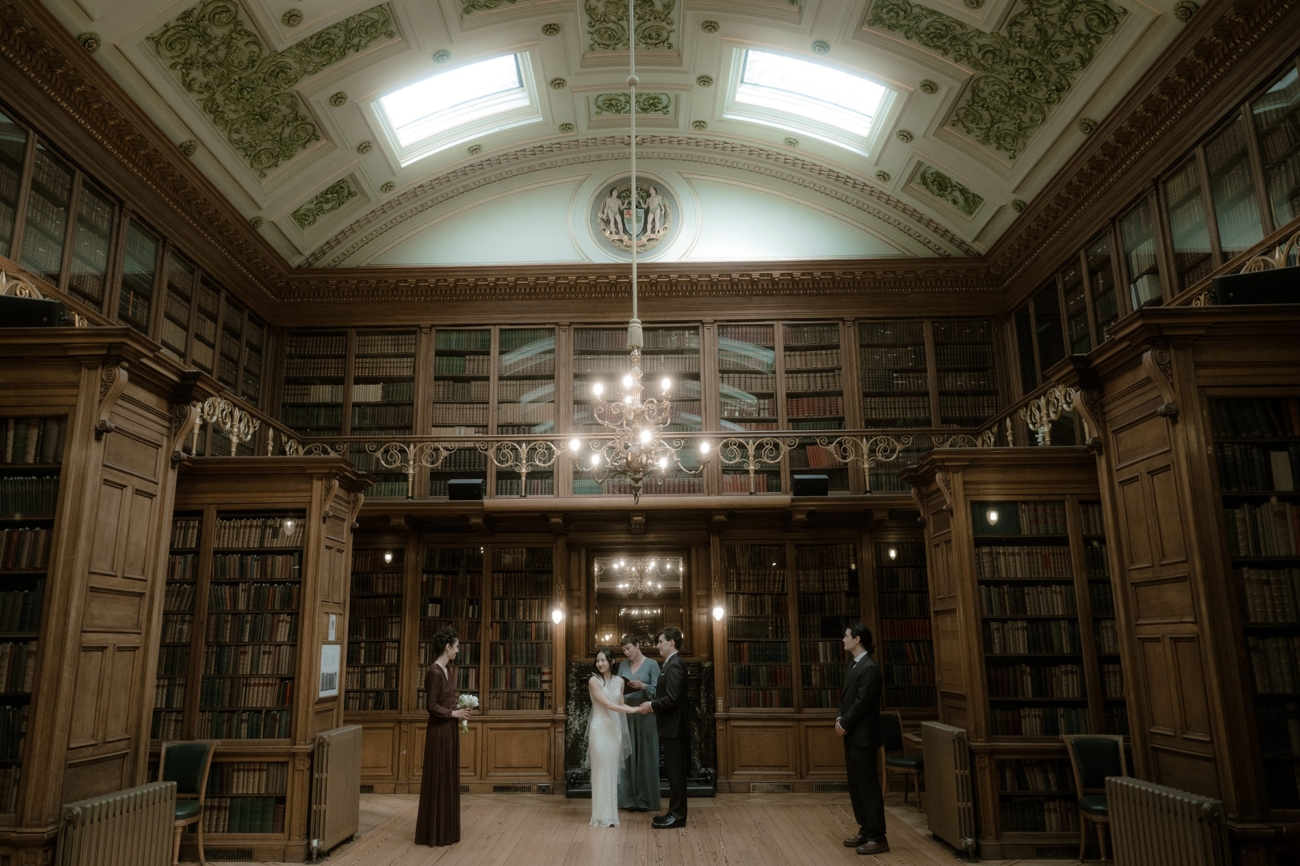
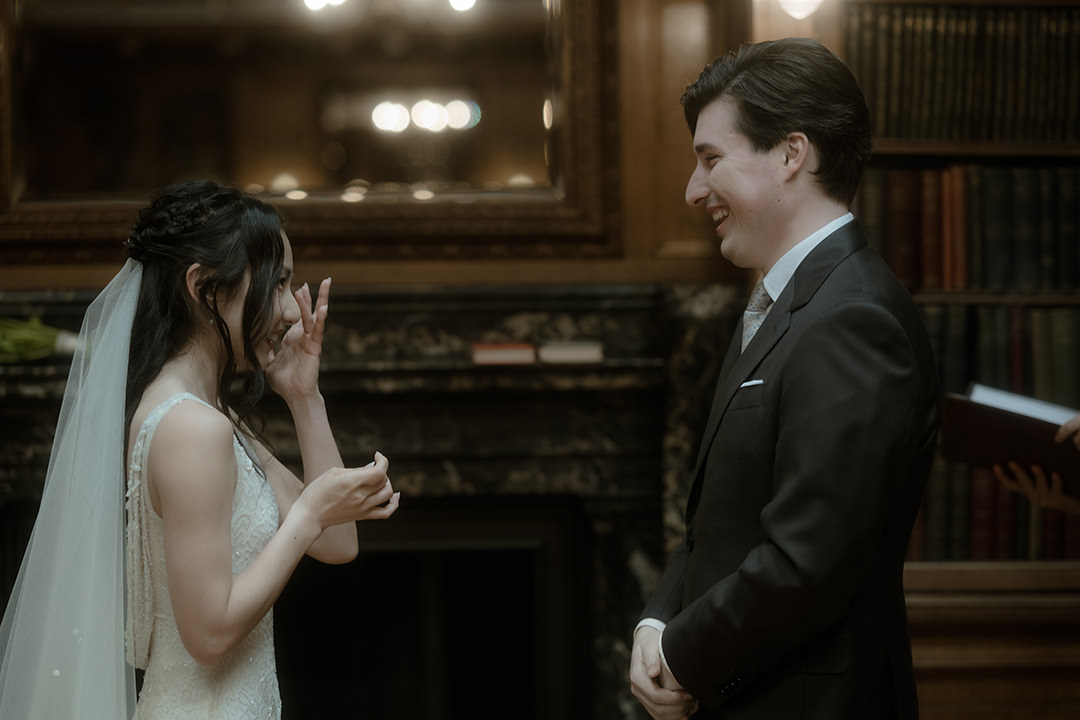
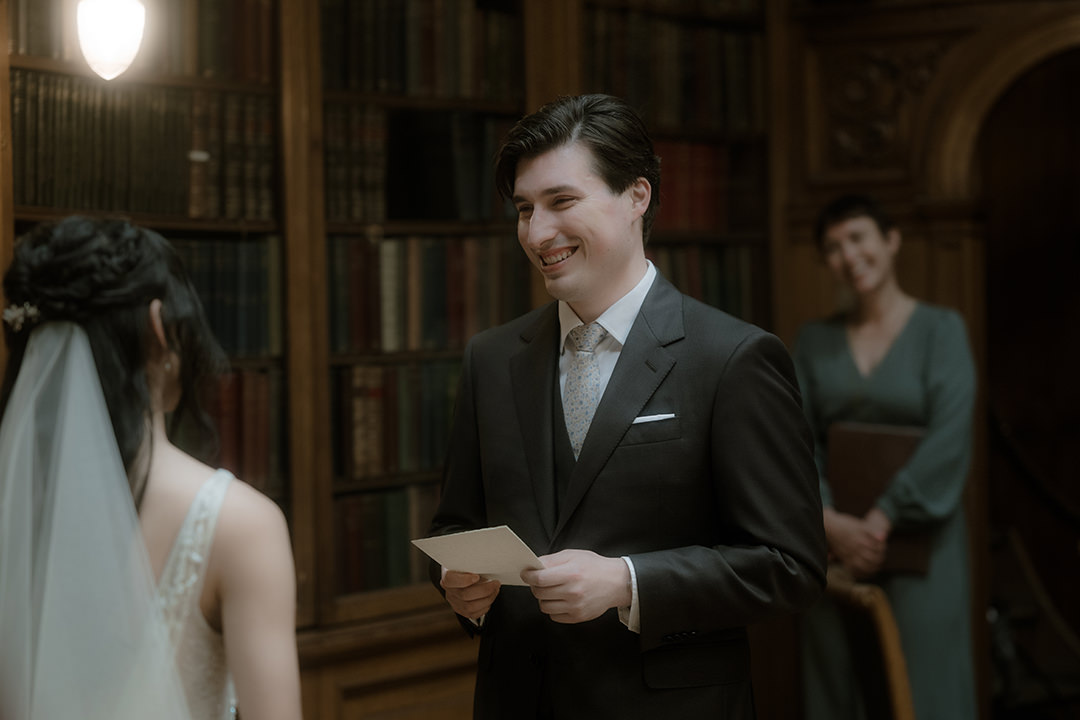
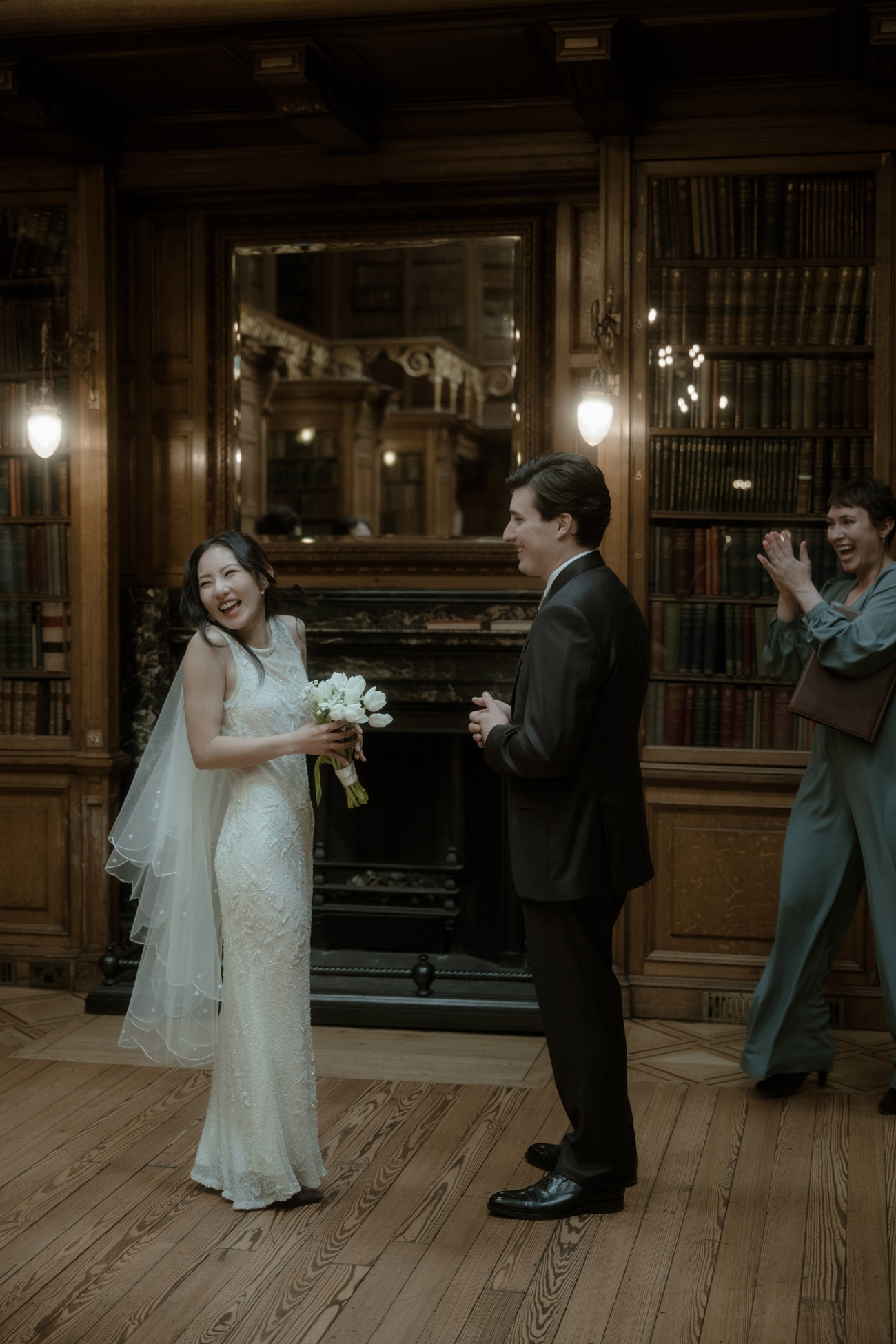
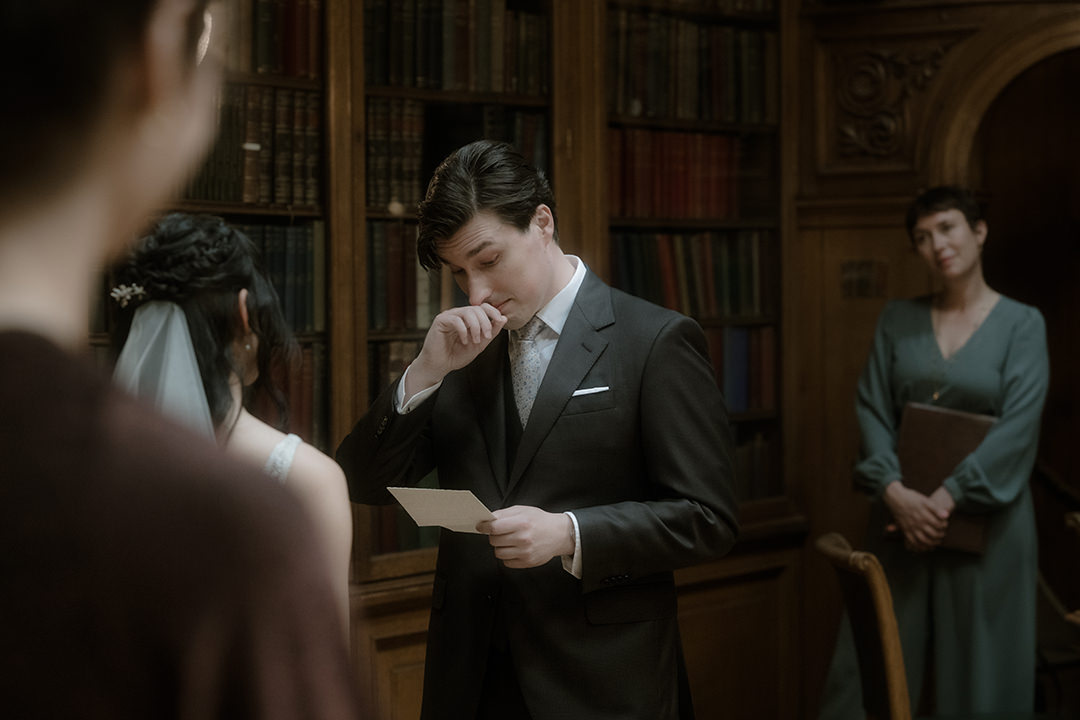
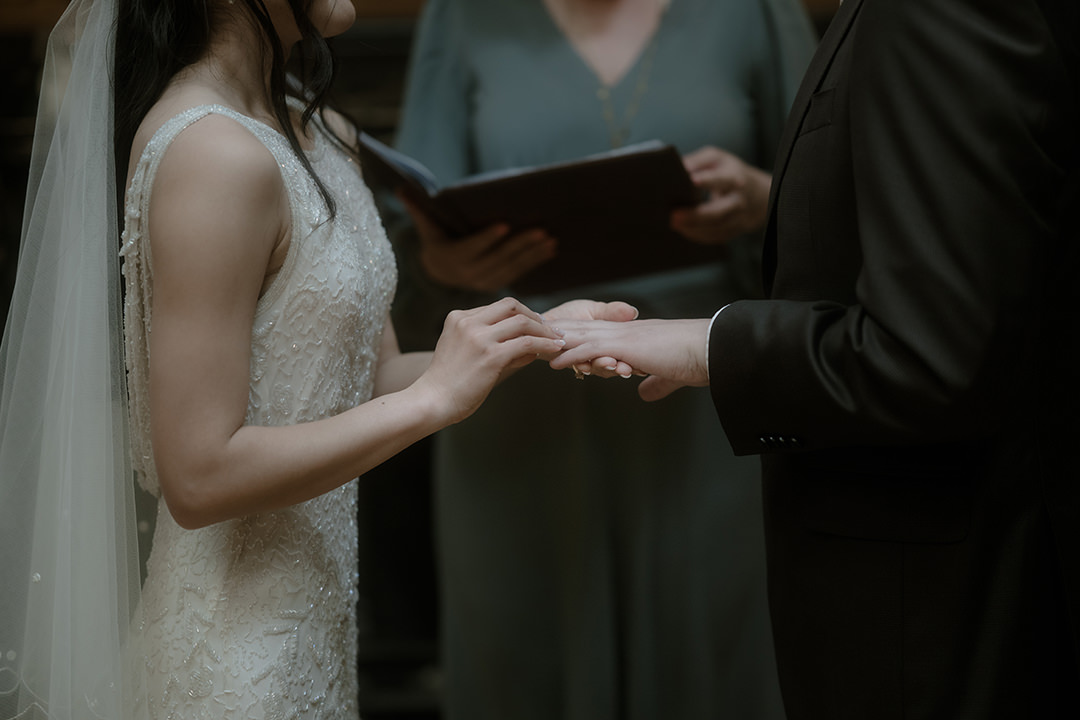
A humanist elopement ceremony is a non-religious, highly personalized wedding ceremony conducted by a trained humanist celebrant.
In Scotland, humanist weddings have a special status: they are fully legal and recognised (unlike in some other countries – that includes England for instance). This means you can have a meaningful, custom ceremony that reflects your values and get legally married all at once – no need for a separate courthouse signing. Humanist celebrants in Scotland are licensed to marry you anywhere in the country, whether that’s an old Edinburgh library, a forest by a mountain loch or atop a misty highland hill.
Importantly, humanist ceremonies are entirely secular (non-religious), but they are far from the impersonal rites you might associate with a quick city hall wedding. Instead, they focus on human connection, love, and your personal story as a couple.
As the Humanist Society of Scotland puts it, “We deliver personalised and meaningful ceremonies in line with couples’ values and beliefs – in other words, the script isn’t coming from a prayer book or a one-size-fits-all template – it’s written just for you.
Humanist weddings have been legal in Scotland since 2005, after which their popularity skyrocketed. In fact, they’ve become so popular that recent statistics show humanist celebrants now conduct around 20% of all weddings in Scotland – even outnumbering weddings performed by any single church denomination. Many couples are drawn to the idea of a ceremony that focuses on who they are rather than any religious or bureaucratic formalities. This popularity is a testament to how meaningful and relevant humanist ceremonies have become for modern couples.
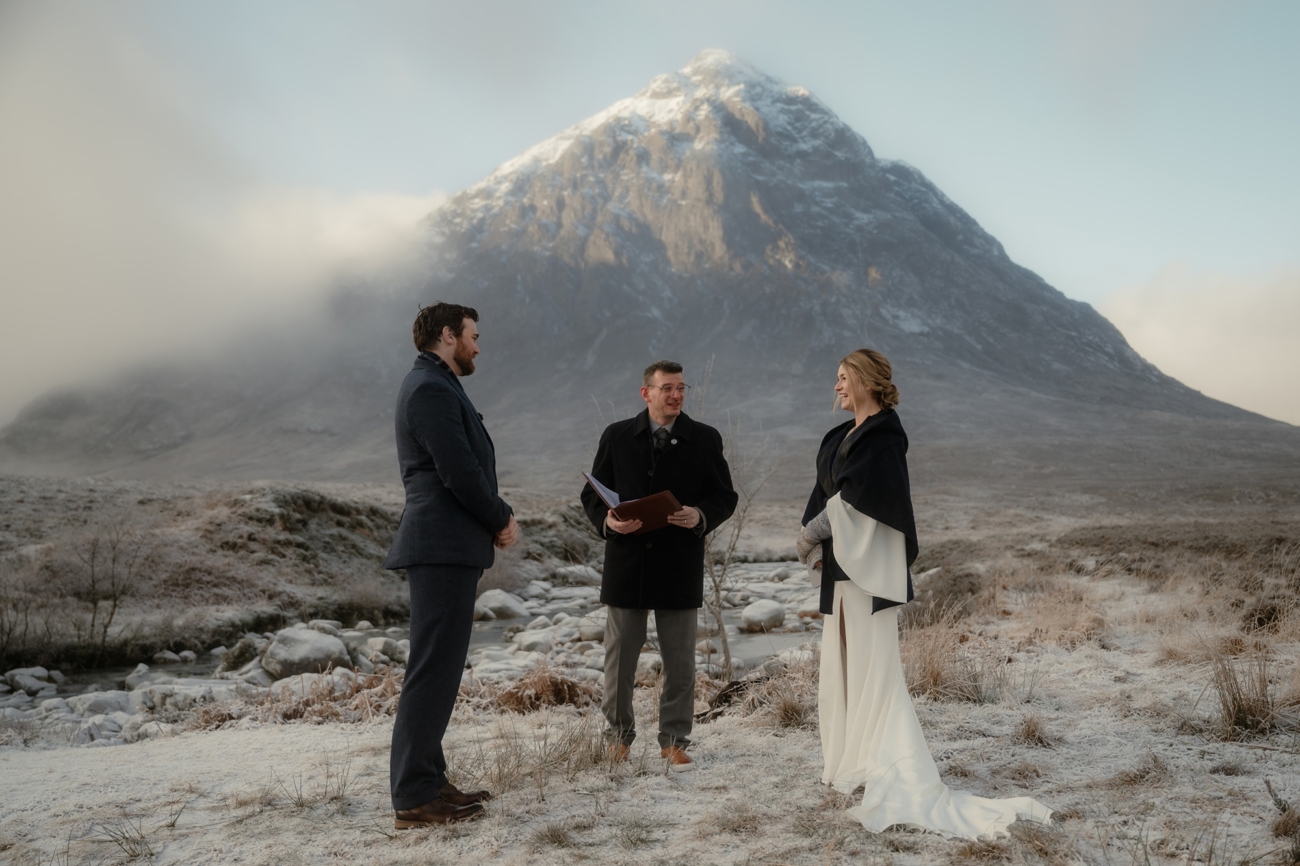
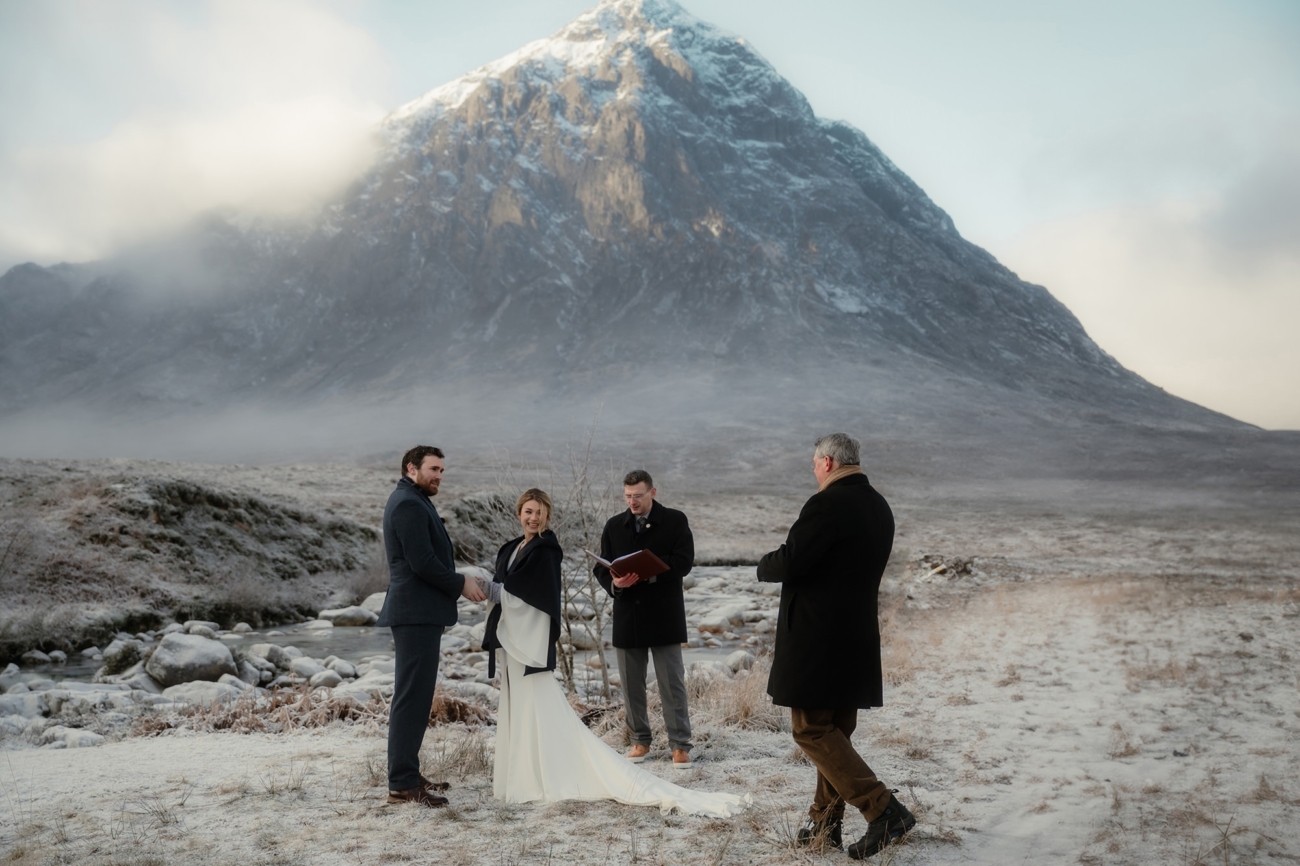
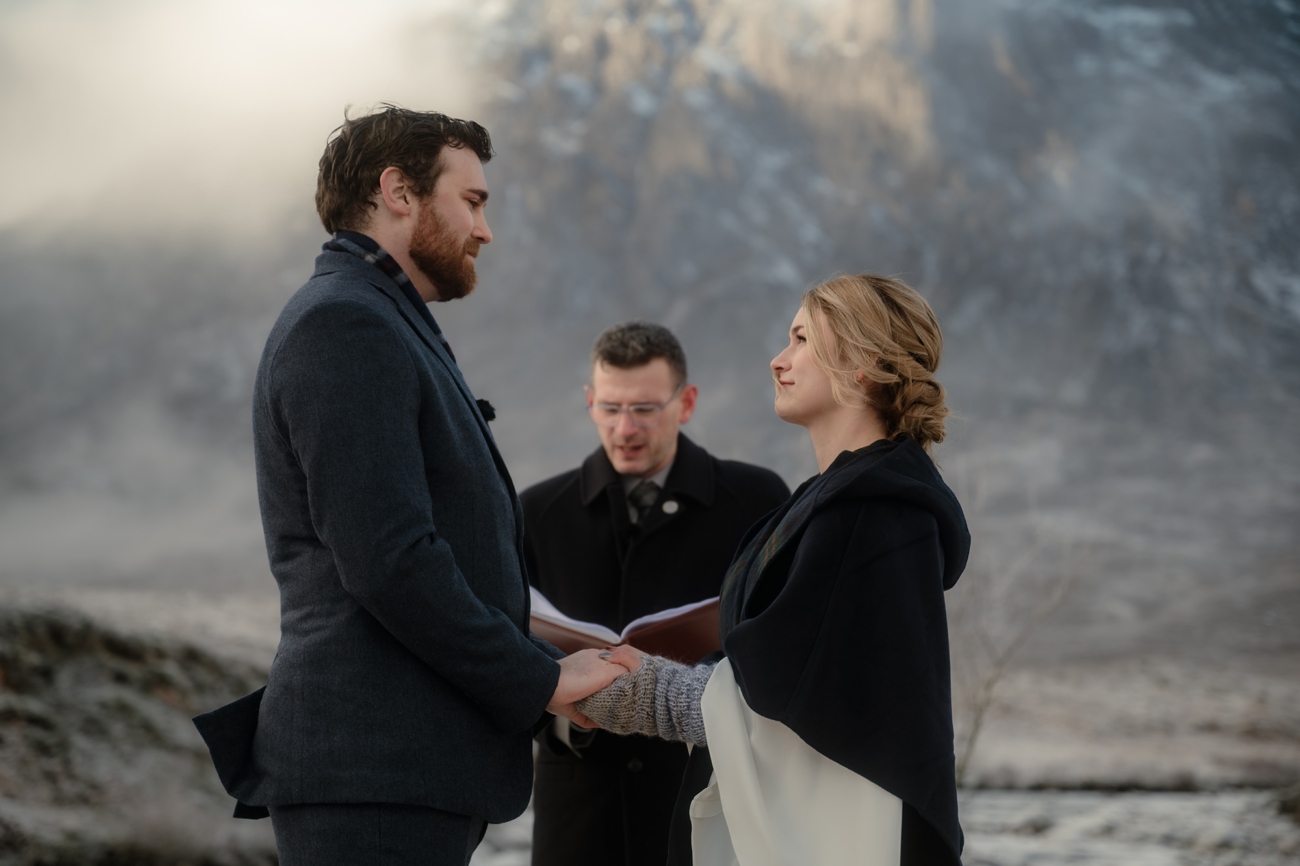
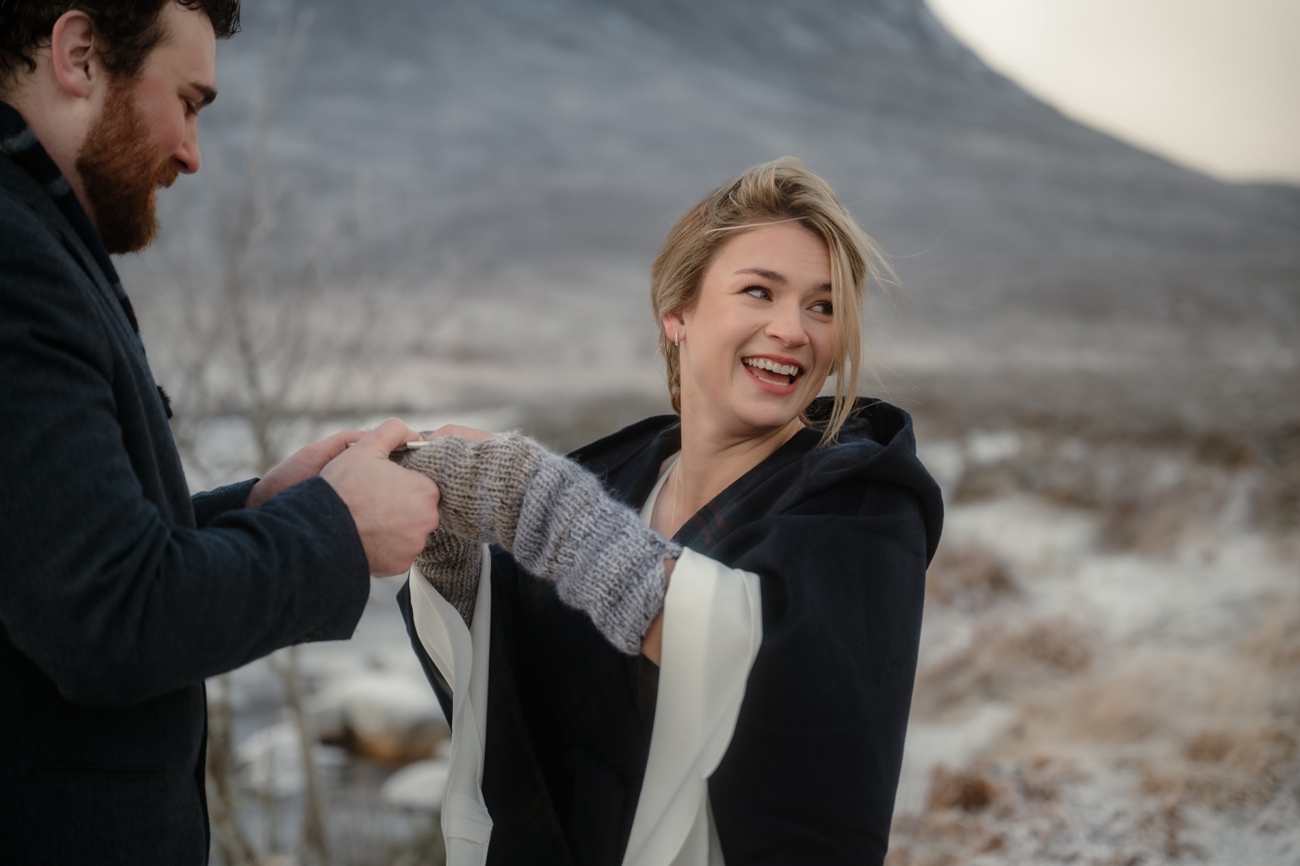
You might be wondering how a humanist ceremony really differs from the more traditional options like a church wedding or a civil ceremony at the registry office.
Here’s a quick comparison to put things in perspective:
In summary, choosing a humanist ceremony means opting for personal meaning over tradition. Of course, if you have strong religious faith, a church wedding might be more significant for you; or if you truly just want a quick, no-frills legal formality, a civil registration could suffice. But if you’re looking for a legal wedding that is non-religious yet deeply personal and customized, then a humanist ceremony is the standout choice in Scotland.
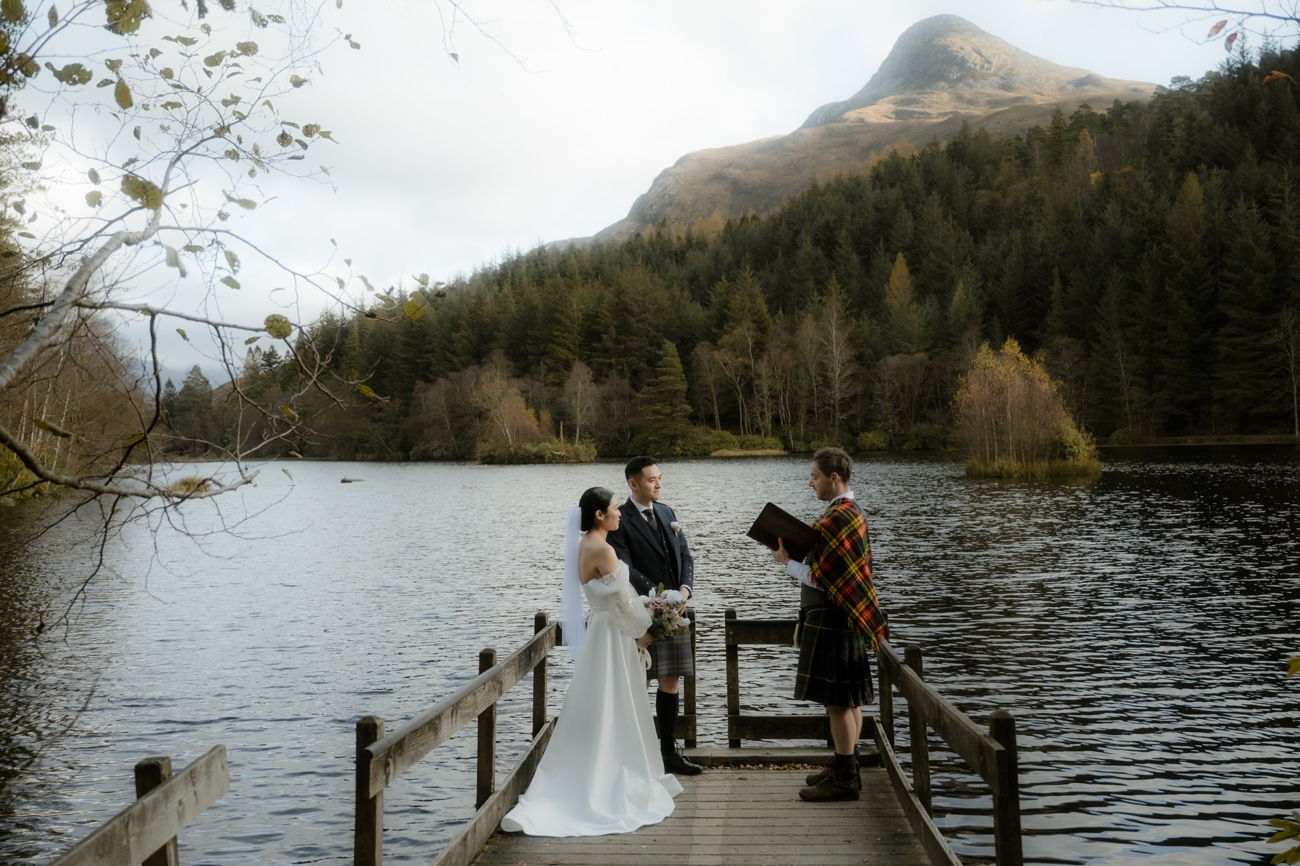
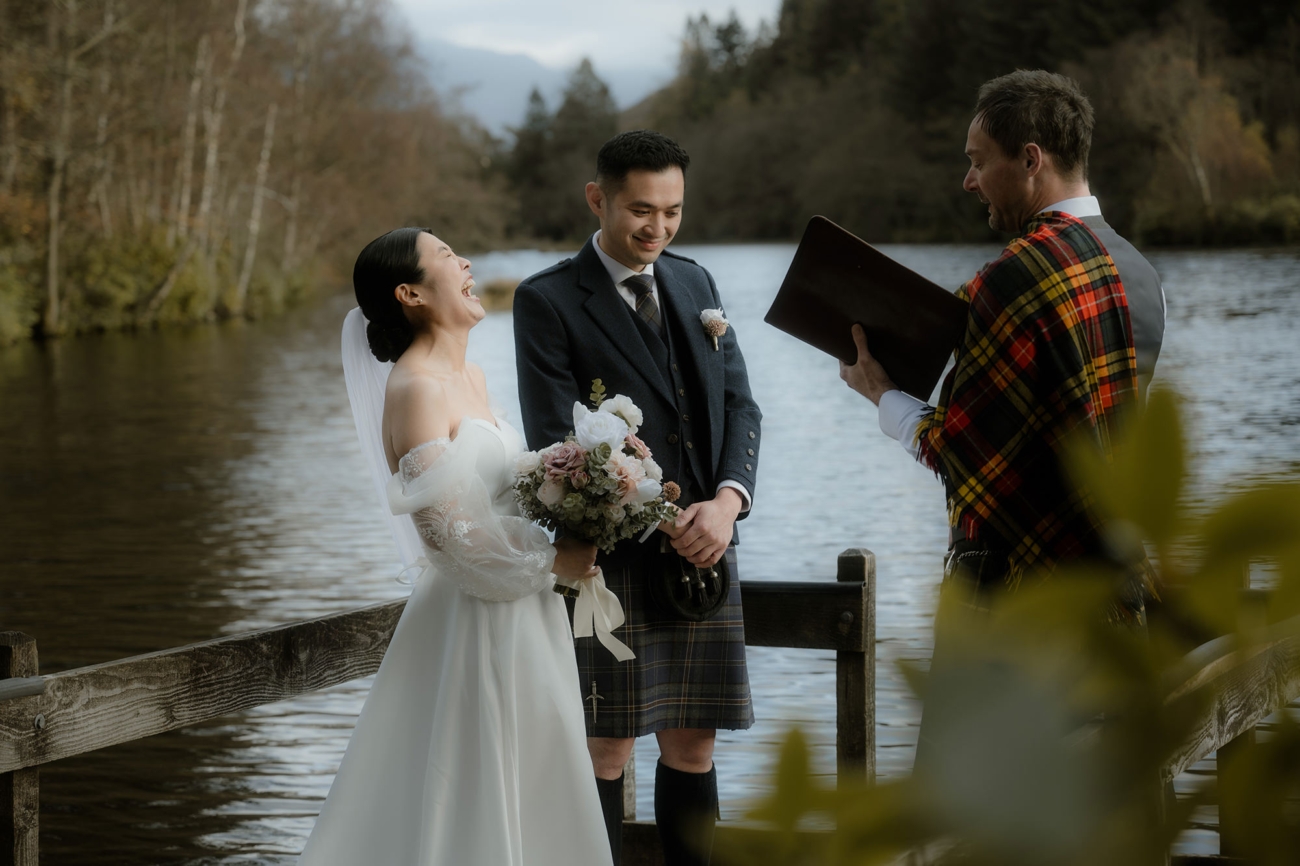
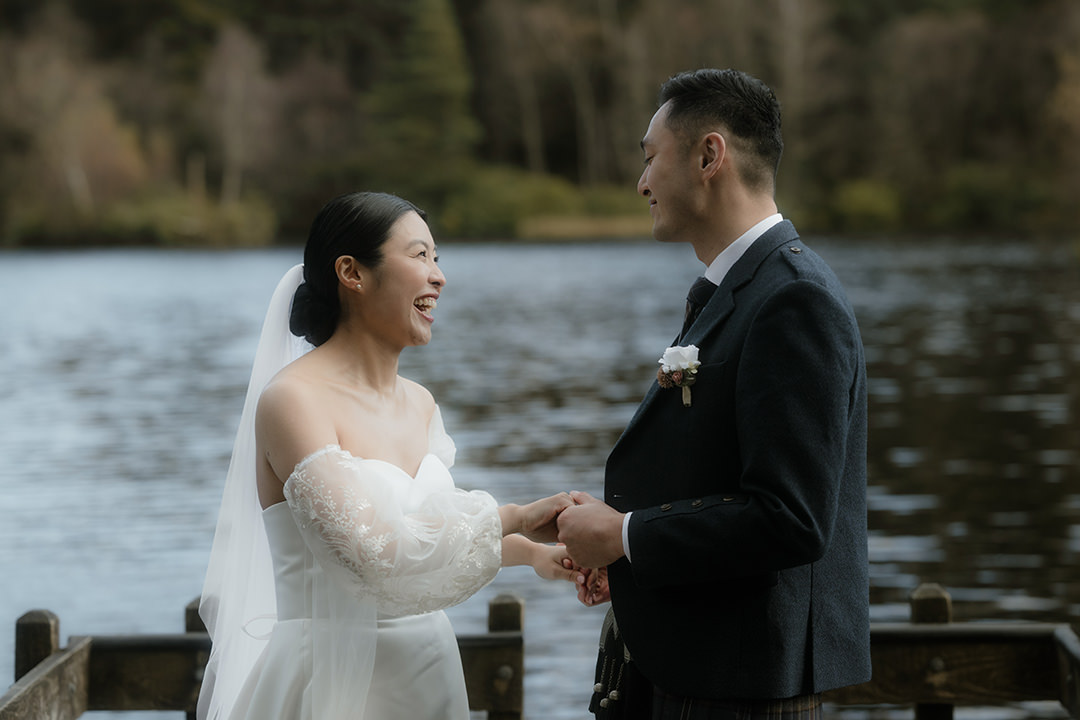
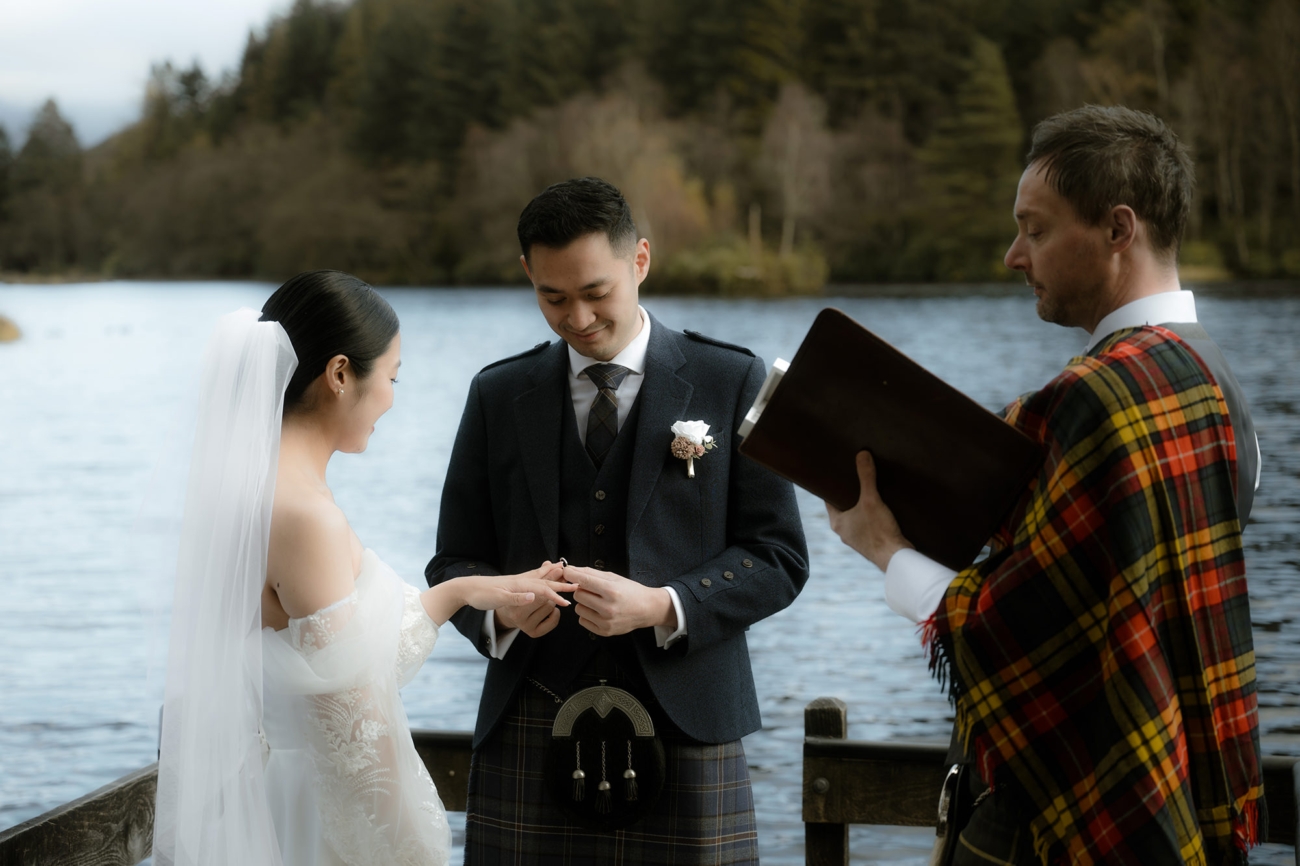
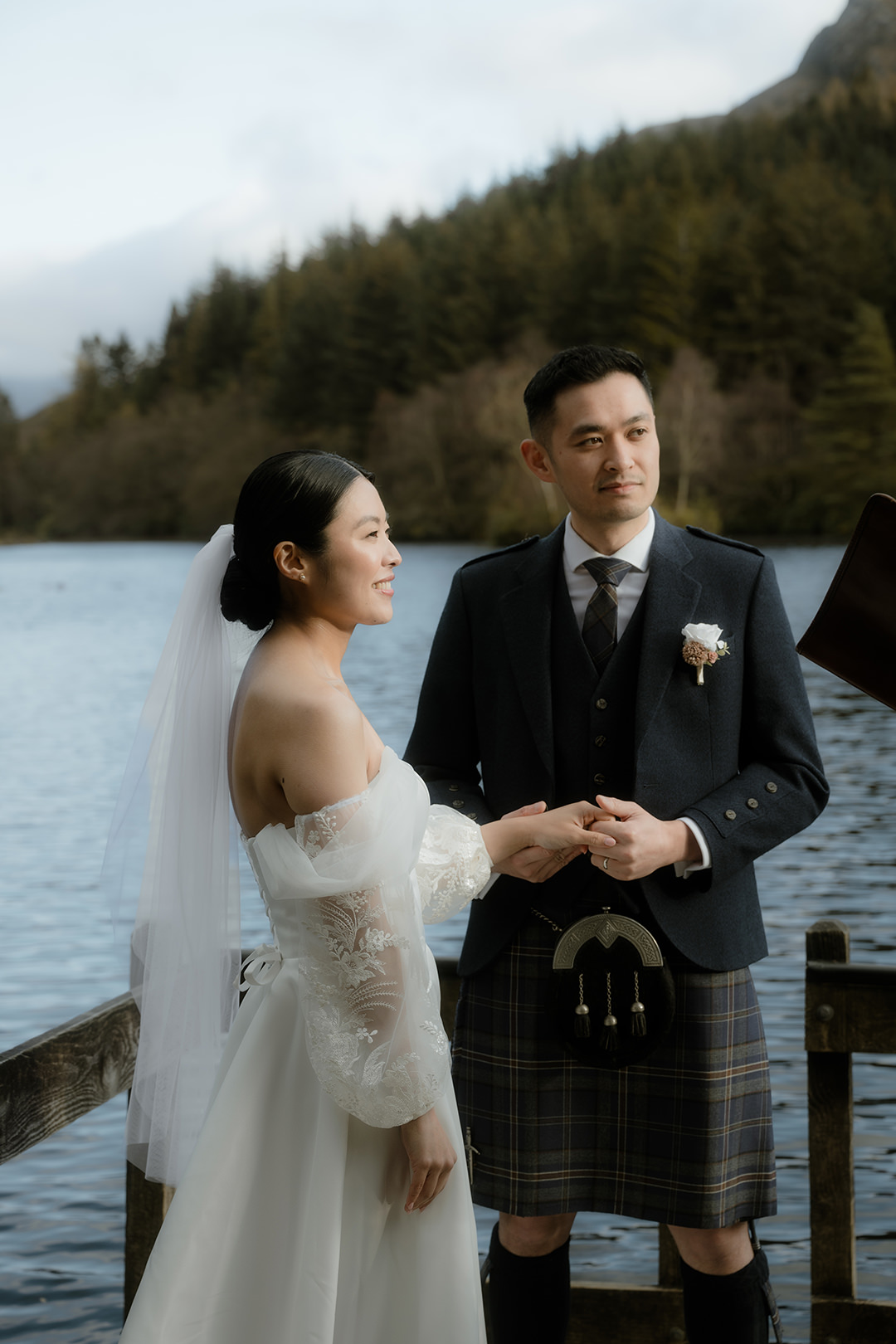
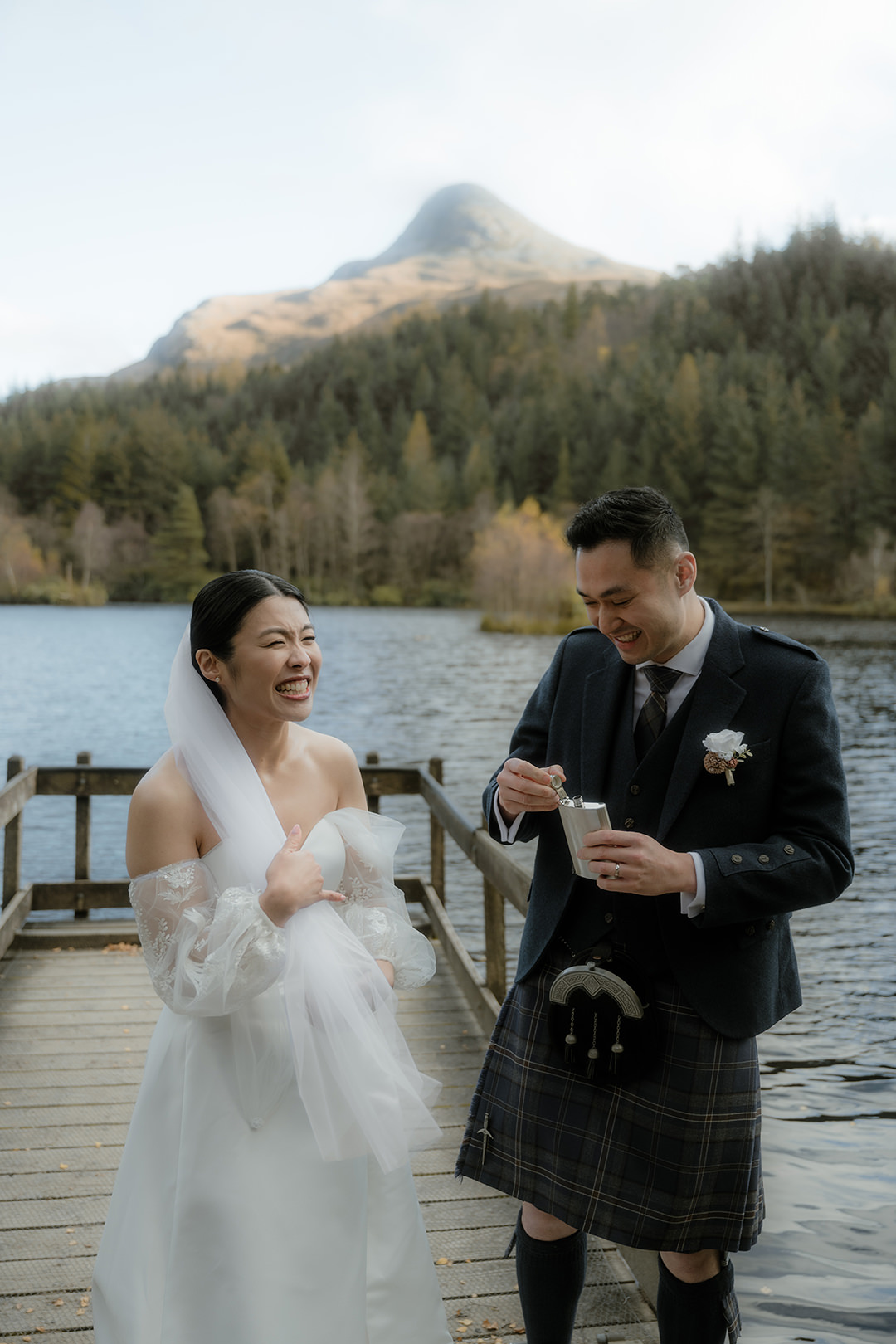
Why are so many eloping couples in Scotland opting for humanist celebrants?
Here are some of the key benefits of a humanist-led elopement ceremony, which might help you decide if it’s the right fit for you:
In summary, the benefits of a humanist elopement ceremony boil down to freedom, personalisation, and meaning. You get a ceremony that feels truly yours in every sense. As a bonus, many humanist celebrants also have a great stage presence and warm demeanor – they are often people who genuinely enjoy storytelling and celebrating love, so your ceremony will likely be engaging for you and your guests, if you’re planning to invite some folk to the ceremony.
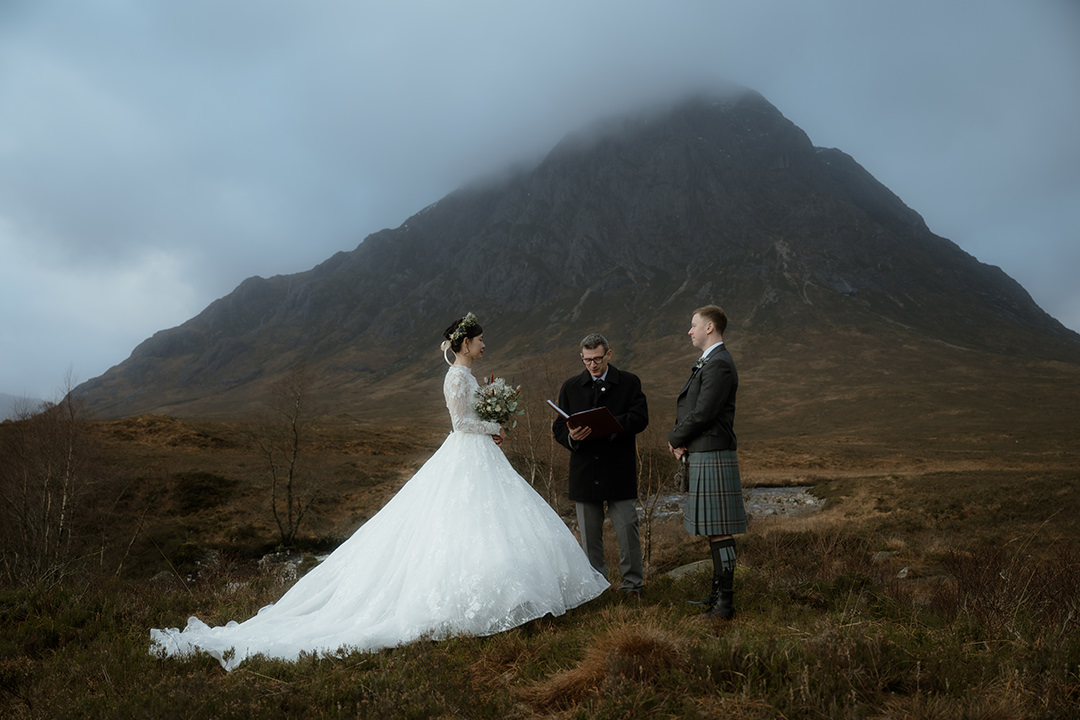
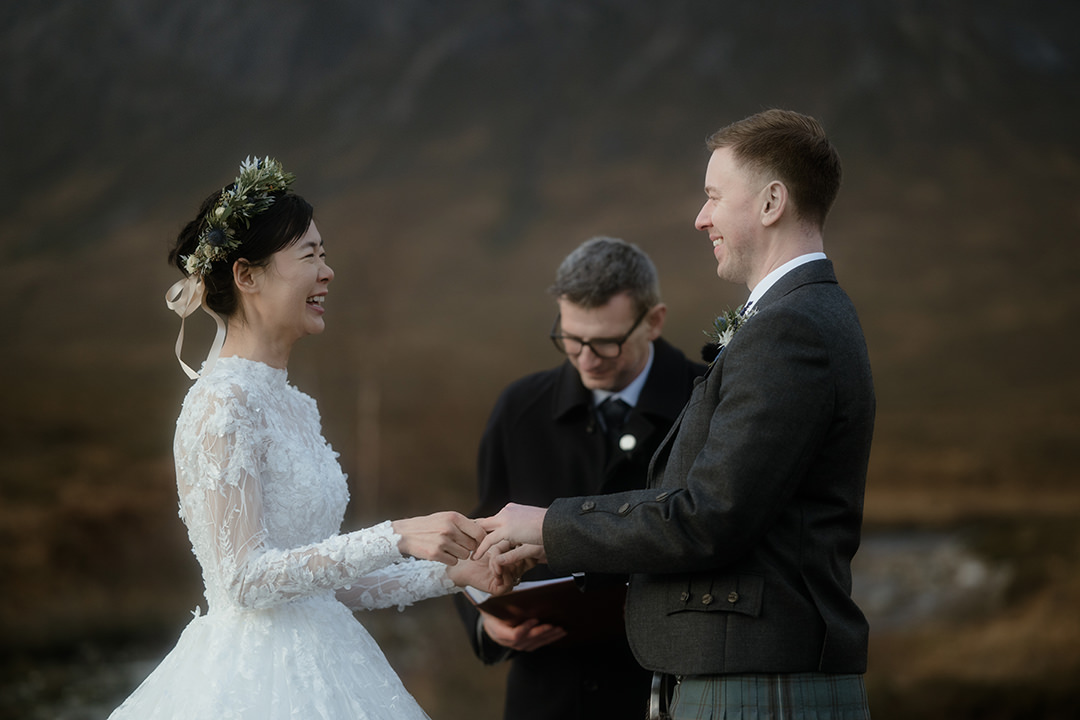
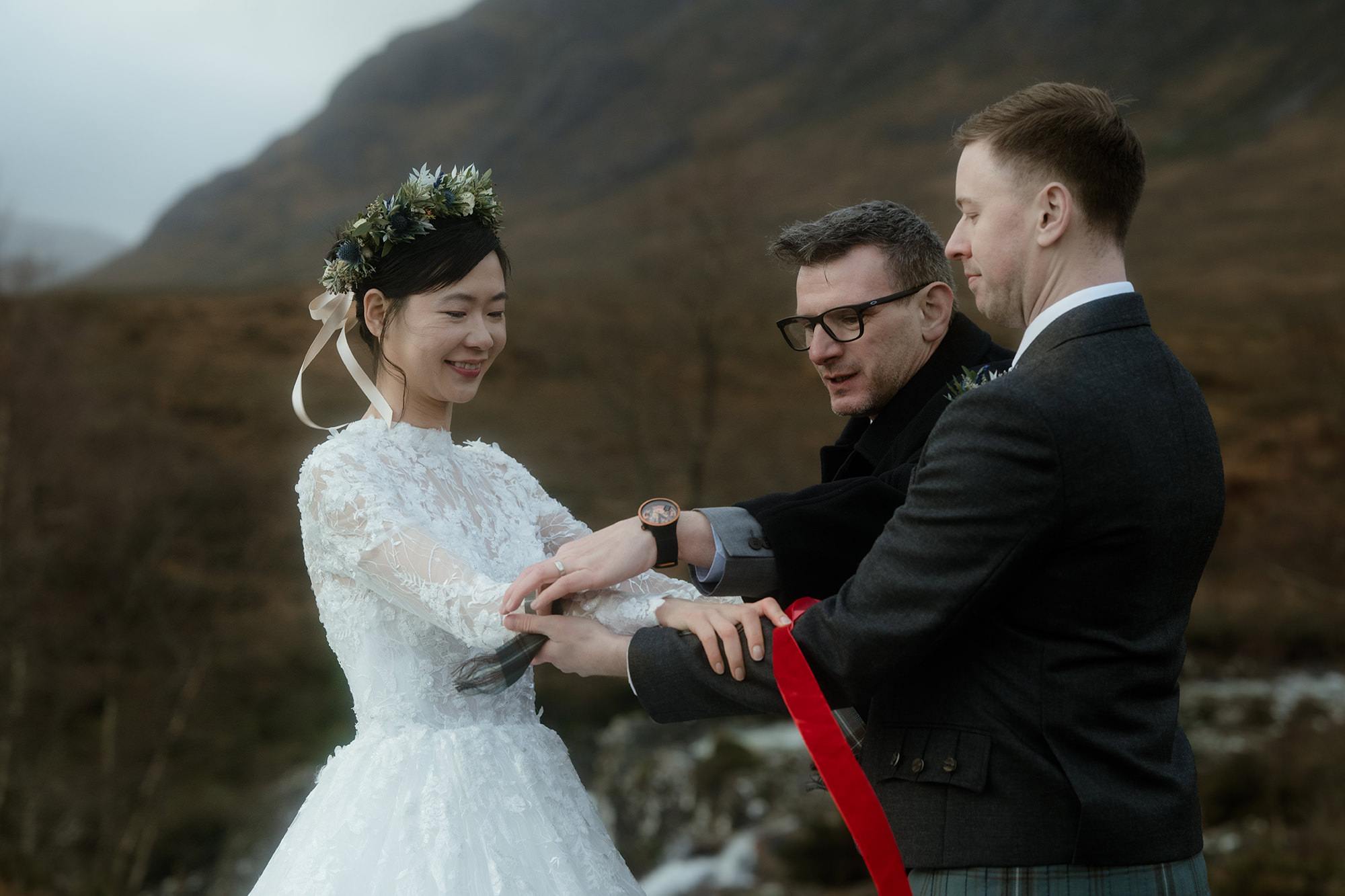
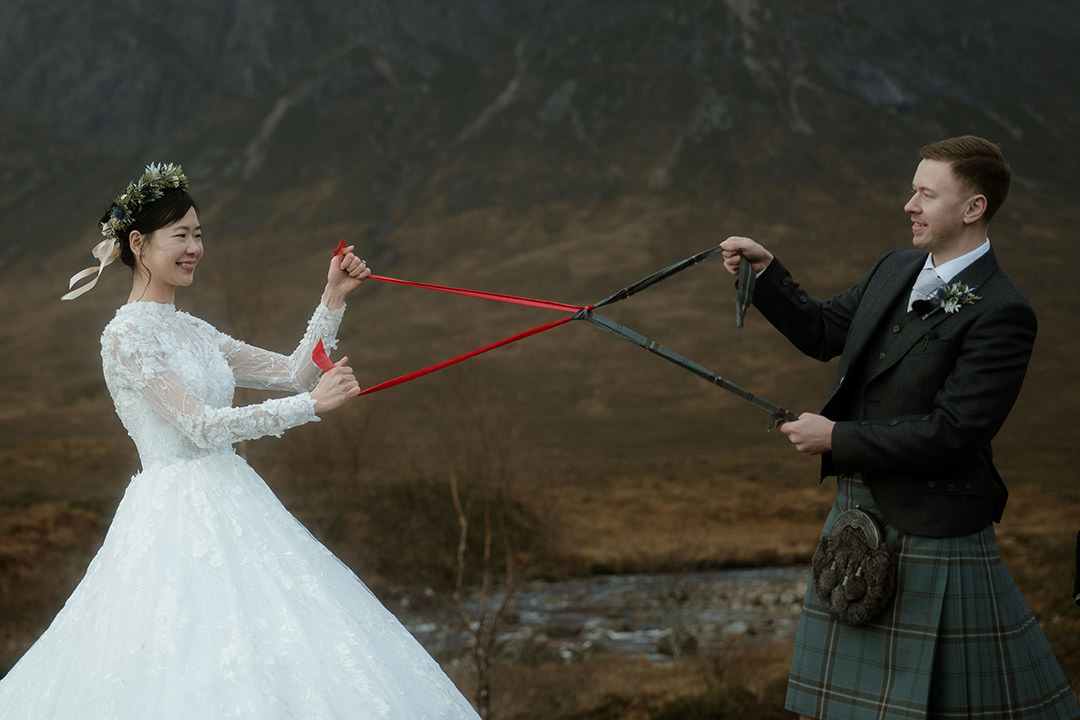
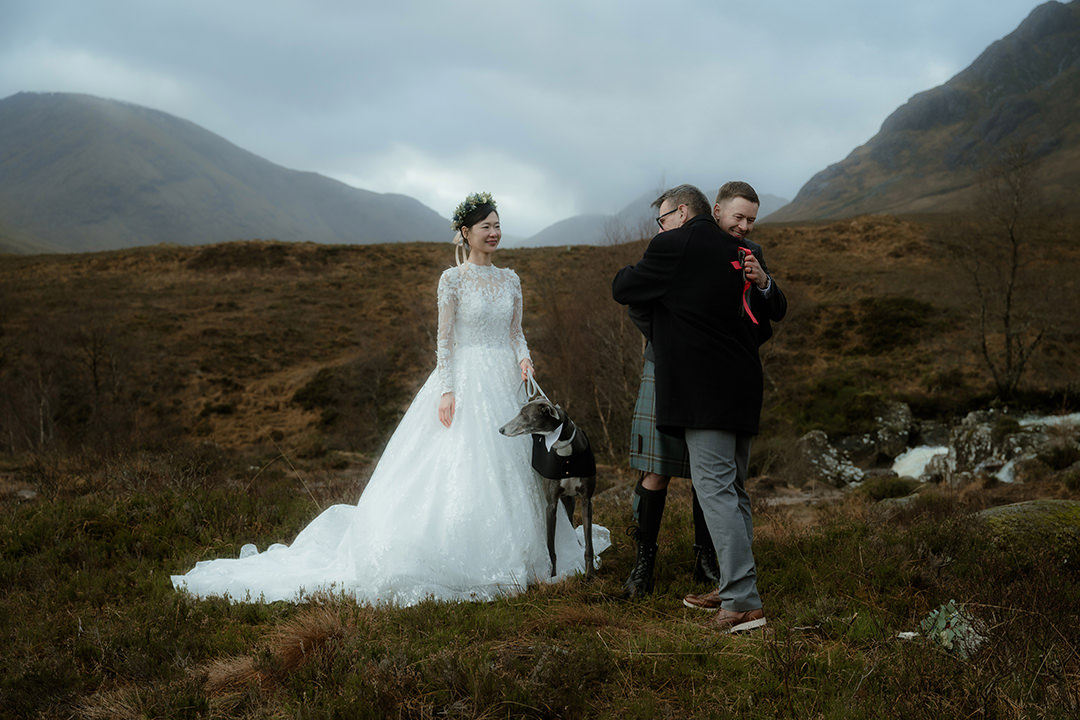
If the idea of a humanist ceremony is appealing, you might be curious about the practical steps to arrange one for your elopement. Here’s a brief rundown of how to plan and what working with a humanist celebrant looks like:
1. Finding the right celebrant: First, you’ll want to choose a humanist celebrant who will officiate your wedding. In Scotland, the most common route is to go through Humanist Society Scotland (HSS), which is the largest organization accrediting celebrants. HSS has a directory where you can search for celebrants by region. (For example, if you’re eloping in Edinburgh, you can find celebrants based in or willing to travel to Edinburgh.) Each celebrant usually has a short bio – you might find someone whose personality or philosophy clicks with you. It’s also okay to reach out to a few to check availability and see who you vibe with. Many HSS celebrants are quite in demand (especially on popular dates in summer), so it’s wise to start your search as soon as you have a date or at least a month/year in mind. Apart from HSS, there are also independent humanist celebrants and those from smaller networks (like Fuze or Agnostic Scotland) who are authorized in Scotland – so you have lots of choice. Some Scotland wedding photographers and planners have recommendations for great celebrants they’ve worked with before (in fact, in my Edinburgh Elopement Guide I list several wonderful humanist celebrants I’ve seen in action!). Take your time to find someone who feels right – this is going to be the person narrating one of the most important moments of your life, so it’s worth it!
2. Initial chat and booking: Once you’ve identified a celebrant (or a short list of them), reach out and introduce yourselves. Typically, a celebrant will suggest an introductory meeting (in person if you’re local, or via video call if you’re far away). This meeting is like a casual interview both ways – you can ask them about how they work, and they’ll want to hear about your wedding plans and what you’re looking for in a ceremony. Don’t be shy – if having a certain type of ceremony is important to you (for example, light-hearted and funny vs. poetic and romantic, or maybe including a handfasting or mentioning deceased loved ones, etc.), let them know. The celebrant will explain their process and likely talk about fees as well. Humanist celebrants in Scotland set their own fees, but generally the cost ranges a few hundred pounds (perhaps around £450-£700, varying by celebrant and location). This typically covers all the prep work, the ceremony itself, and often the celebrant taking care of submitting the signed schedule after the wedding. After the initial chat, if you’re happy, you’ll book them for your date (usually via a booking form and a retainer to secure the date).
3. Crafting the ceremony script: Here’s where the magic happens! Once booked, your celebrant will start gathering material to create your personalised ceremony. Different celebrants have different methods: some may send each of you a questionnaire to fill with details (like “what did you first notice about your partner?” or “what do you love most about them?”), others might ask you to write letters or short essays about one another, and some will just schedule a longer joint interview to get the stories out. Often, it’s a combination of these. The celebrant is looking for the anecdotes and sentiments that make your relationship unique. This process is actually a lot of fun – many couples find it makes them reminisce and feel even more connected leading up to the big day. Don’t worry if you’re not a writer; the celebrant is used to all personality types and will guide you. Based on all this input, the celebrant will draft a ceremony script. Sometimes they keep parts as a surprise for the day (so your reactions are genuine), and sometimes they’ll run the full draft by you – different officiants have different styles regarding how much they reveal beforehand. You can usually request changes or mention if there are things you’re not comfortable sharing in public, etc. Remember, it’s your story, and you have final say. Also, if you plan to write personal vows to each other, your celebrant can give you pointers on length or tone so that it fits well within the overall ceremony. By the end of this process, you’ll have a script that feels just right. It might include, for example, an opening welcome, maybe a reading by a friend or a cultural ritual, then your exchange of vows and rings, the legal declaration, pronouncement as a married couple, and closing remarks. There is no requirement for any specific wording beyond the one legal line, so it really will be built around what you want.
4. Paperwork and legalities: Even though your celebrant handles the ceremony, you as a couple are responsible for the standard marriage paperwork. For any marriage in Scotland (humanist, civil, or religious), you must submit an M10 Marriage Notice form to the local registry office (called National Records of Scotland) at least 29 days before the wedding. It’s straightforward – you fill in your details, your intended date and location, and who will officiate (your celebrant), and provide required documents (like birth certificates, passports, and if applicable, divorce or change-of-name documents). Since you’re eloping, you may also be coming from abroad – thousands of international couples marry in Scotland every year, so the process is well-established. The local Registrar’s office will issue your marriage schedule, which is the document you, your partner, the celebrant, and two witnesses will sign on the day of the wedding. After the ceremony, the celebrant will typically return that schedule to the Registrar within 3 days to register the marriage officially. (Pro tip: Don’t forget you need two witnesses over age 16 present at the ceremony to sign the schedule. If it’s just the two of you eloping, this can be literally anyone – oftentimes your wedding photographer and maybe a videographer or a friend can serve as witnesses. Once the signed schedule is submitted, you can obtain your official marriage certificate. Your humanist celebrant will guide you on these steps and double-check you’ve done the paperwork correctly in advance. They do this all the time, so you’re in good hands!
5. The wedding day: On the day of your elopement, your humanist celebrant will show up early at the ceremony location to coordinate and set up with you or any vendors. They might chat with your photographer about positioning (so photos of the vow exchange turn out well) and ensure any ritual items (like cords for handfasting or the quaich cup, if you’re doing those) are in place. During the ceremony, soak it all in – this moment was tailor-made for you! After the vows and the first kiss, there will be the signing of the marriage schedule (at an elopement, you can do it even on a makeshift surface like a flat rock if you’re on a hilltop – I’ve seen it happen). This is where your witnesses sign too. Your photographer will likely capture this candid bit of “legal” action (I always do!). Then hooray – you’re officially married! Your celebrant will usually take the schedule for safekeeping to deliver to the registrar. Often, couples and celebrants will take a celebratory photo together as well – by now you might feel they are an important part of your story. From there, you continue on to any other activities (perhaps popping some champagne, going off for more portraits around town, etc.) while feeling on cloud nine that not only are you married, but the ceremony was exactly as meaningful as you hoped.
6. Follow-up: After the wedding, you may need to request copies of your marriage certificate from the registry office (this is done by paying a small fee per copy). If you’re from abroad, ask for a few copies and perhaps an apostille if needed for your home country’s legal system. Your celebrant’s job is essentially done, though many love to hear from couples afterwards – they might even feature your story (with permission) as an anecdote for future clients or on social media. And if you really connected, who knows, you might stay in touch or have them do a vow renewal or baby naming ceremony down the line!
Planning a humanist elopement ceremony may involve a bit more preparation and communication than a simple civil ceremony would – since you will be crafting something unique – but the effort is so worth it. Most couples actually find this process enjoyable and bonding. It turns the typically “dry” task of planning a ceremony into something creative and personal. And don’t worry, your celebrant is there to handle the heavy lifting in writing and structuring the event; they do this professionally, so trust their expertise and suggestions.
One thing to note: Humanist Society Scotland (and other celebrant networks) often require the couple to become members or pay a contribution as part of the booking – this is usually nominal and goes toward supporting the society. Your celebrant will inform you if that’s the case. It’s a small formality given that they are providing you a bespoke legal ceremony in return.
Finally, if you love the idea of a humanist ceremony but also want a religious blessing or another element, remember you can always have a humanist wedding legally and then separately have a priest/pastor do a blessing or a cultural ceremony either before or after. Some couples do this to honor family traditions while still keeping their actual wedding ceremony personal and secular. Scotland’s flexibility allows you to mix and match in that sense (though only the humanist or religious one would be the “legal” marriage – you’d choose one or the other to be the official).
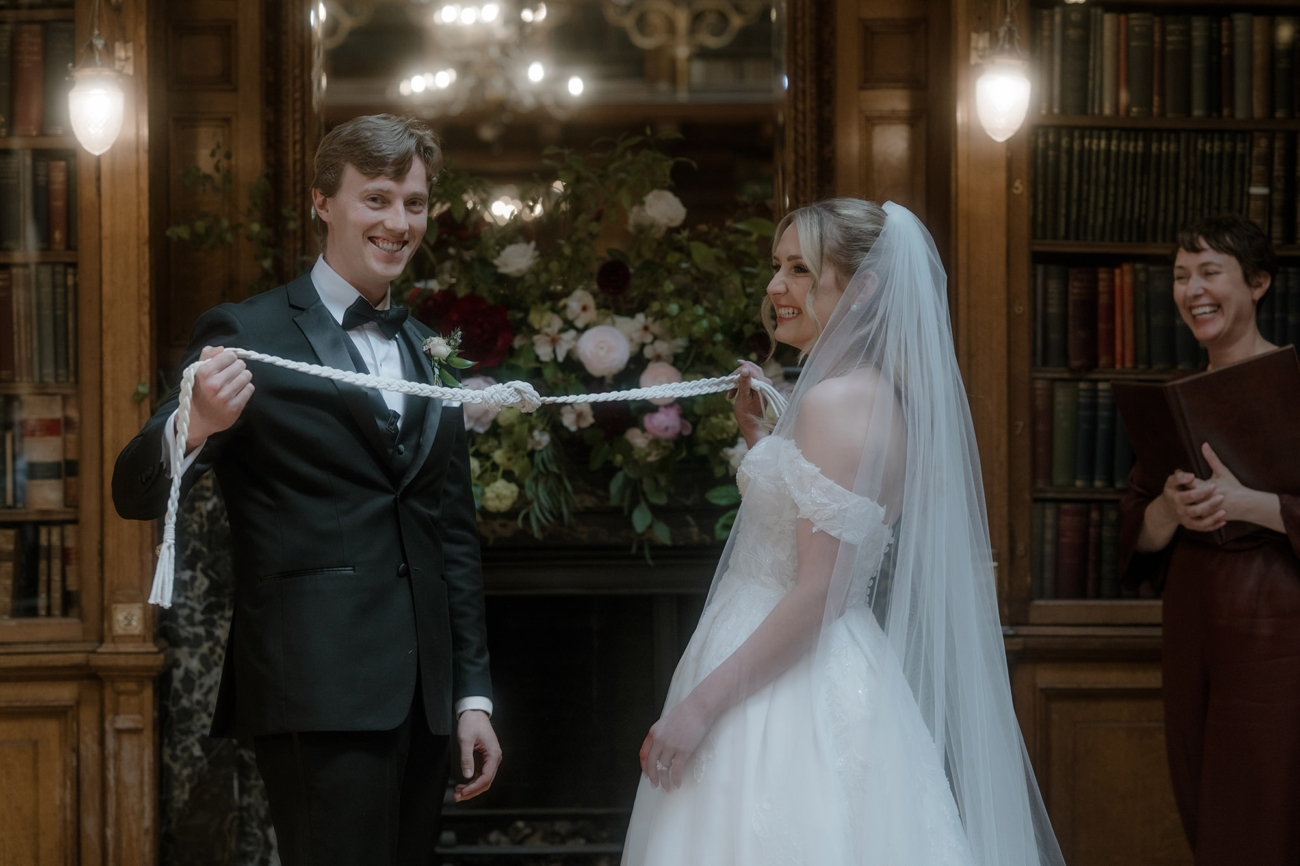
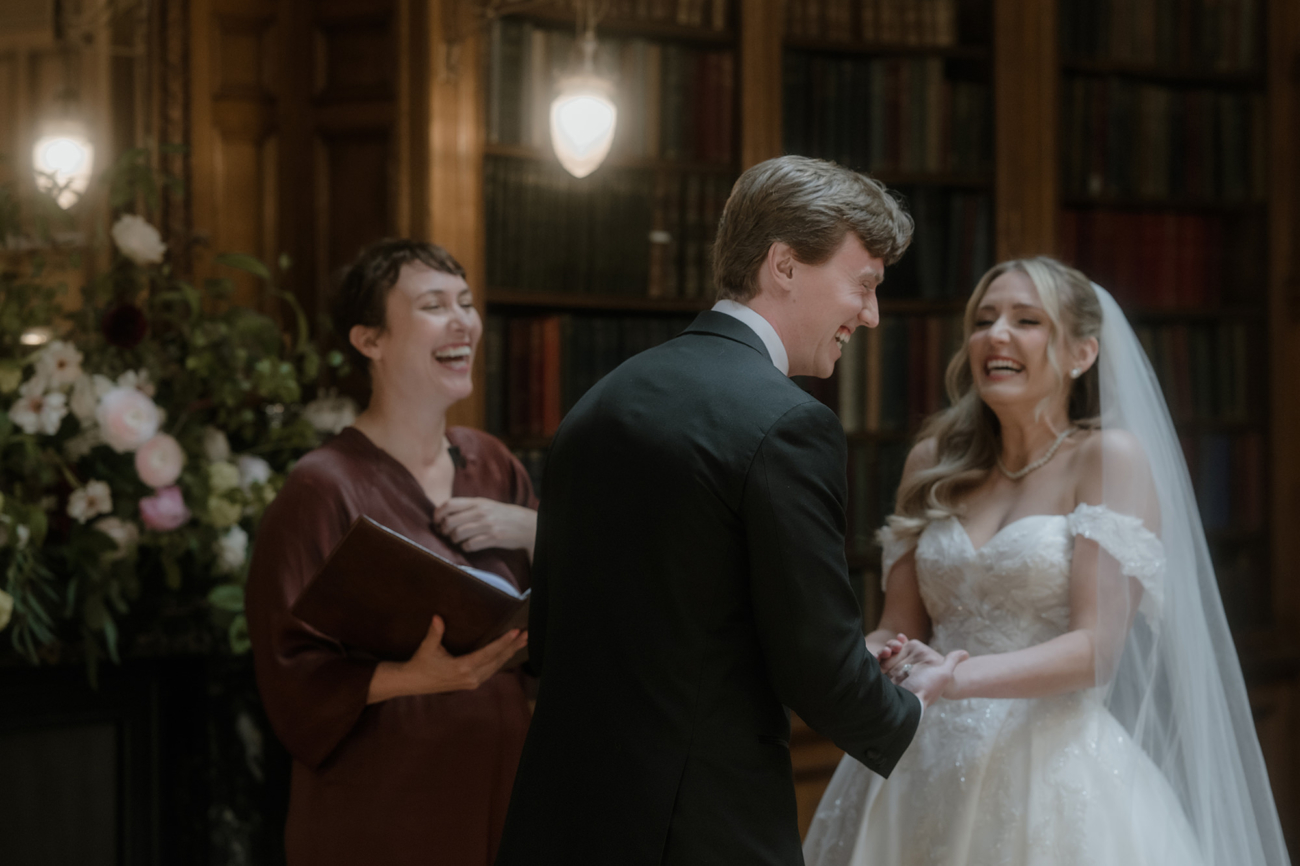
After covering all this information, you might already have a gut feeling about whether a humanist elopement ceremony suits your vision.
If you’re drawn to a non-religious wedding that’s fully personalised – where you choose the vows, readings, and rituals – a humanist ceremony is a perfect fit. It’s especially popular for elopements and intimate weddings, since stripping away the big guest list leaves room for a ceremony that truly reflects your story. A humanist celebrant can weave in your love anecdotes, poetry, or quirky unity rituals – whether you’re on a hilltop or in a historic library – and make every moment feel meaningful.
On the other hand, if you prefer a traditional religious service or simply want a quick legal formality (“sign the papers and go”), a registrar-led ceremony might suit you better. In my experience photographing dozens of Scottish elopements, the ceremonies people remember most are those rich with authenticity and emotion – and humanist weddings excel at both.
Ultimately, the right choice comes down to the experience you want. If you dream of a ceremony that feels uniquely yours – legally binding yet deeply personal – a humanist elopement in Scotland could be the ideal way to start your married life.
And don’t be shy, reach out to ask me for my recommended humanist celebrants in Scotland – and let’s start planning your dream elopement day!
And scroll down to see some of the Frequently Asked Questions.
The cost usually ranges between £450 and £700 – to keep the costs down always try to get a celebrant local to the area.
Yes! Having worked with so many clients from abroad it totally makes sense if you’d rather avoid paperwork – applying for visas and the stress of getting married here legally – instead you’d like to sign the marriage papers back home, but have a meaningful, symbolic humanist ceremony here in Scotland.
As soon as possible, but if you’re planning a weekday ceremony, then we’ll be able to find you someone great even at short notice!
Are you able to travel to our ceremony location? If the ceremony spot requires a hike, are you able to make it with us? Can you explain the process after booking you – leading up to the ceremony? Are there travel fees? Can you talk us through what our ceremony might look like, based on our ideas? If we change our ceremony location, would you be able to be flexible around that?